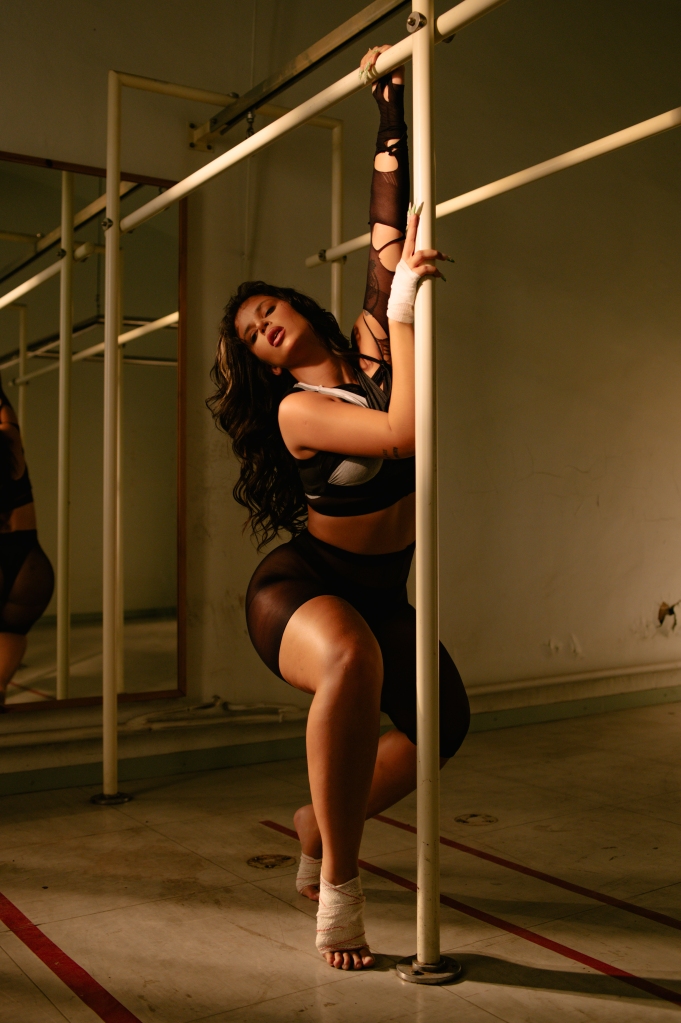There has never — never — been any question that Nathy Peluso, the Argentine-born singer-songwriter, was going to spend her life in pursuit of creative transcendence, so much so that even as a young girl, she didn’t bother contemplating her life as anything other than as an artist. “I never thought about the price of living a life where the fundamental pillar was creativity,” she says. “There is a lot of sacrifice and it all depends 100% on your energy [but] that’s what I have to do — even if it there is a cost, it would cost more not to do it.” The rising star is still fresh into her career, releasing her first full-length album, the confident, infectious Calambre, only last year. But it’s clear to anyone who hears or sees her that she was born to be exactly where she is — on stage, in front of audiences, belting her heart out. “If I did not do this,” she says definitively, “I do not know if I could do something else.”
.
Peluso spent her early years in the Saavedra neighborhood of Buenos Aires, Argentina surrounded by inspiration. “It was a beautiful childhood full of beautiful memories — music, rich foods, good people. I always grew up with positivity,” she remembers. She heard a wide swath of musical genres, a variety that informs her to this day; Calambre is a varied trip through R&B, salsa, hip-hop, reggaeton, pop, and funk, which she credits, in part, to the freeform creativity of her upbringing, which included dance classes and lots of music from all sides of the spectrum. “We listened to a lot of classical music and a lot of Latin music. I went to jazz dance and to ballet,” she says.
At 10, she emigrated to Spain with her family, originally to Alicante, then to Murcia. At first, she began performing at local restaurants and hotels as well as uploading YouTube covers of classic jazz songs by singers like Ella Fitzgerald and Nina Simone. By her teenage years, she was increasingly immersing herself in hip-hop, and started to rap on her own after being influenced by the American sound. “I discovered hip-hop when I was 15 years old — on an MP3 by Notorious B.I.G. I discovered Wu-Tang Clan and Run DMC and Lil Kim and Timbaland and Dre,” she says. “Suddenly I started flashing really hard with that energy. And I started rapping in a very natural, unexpected way.”
.
She eventually moved to Madrid to pursue big city dreams. She began to record her raps over lo-fi beats, working odd jobs to pay the bills, including as a telephone operator, at a factory assembling cardboard boxes, and as a waitress at places like Dominos, doing street poetry on the sidewalk for extra cash. “I always had the blind faith that they were temporary, transitional jobs,” she says. Eventually, something clicked with the loose, jazzy “Esmerelda,” a free-flowing backpack-rap style track from 2017 that found her playfully experimenting with her wordplay. “With that song, I connected with many people,” she says. “As a result, it was a one-way journey with hip-hop — I clung a lot to that creative language. I love to sing, but when it comes to rapping I can do it without thinking. The songs that have more lyrical complexity are the ones that I thought the least about, it’s like there’s a home there in my mind for rap.”
2020’s Calambre was enough to get her noticed, garnering her a pair of Latin GRAMMY nominations and worldwide acclaim. And now, there is “Mafiosa,” her latest single, a nostalgic but entirely refreshing take on classic salsa. “It’s a genre that brings me a lot of joy, a lot of happiness in my everyday life. I hang on to salsa to survive,” she says. “I wanted to loosen the cliché salsa. Present something fresh. Not only do 70-year-old Latin men listen to it [laugh] — salsa is cool, salsa is dangerous.” In the lyrics, she offers a cheeky rejoinder to men who aren’t tough enough to handle the intensity she brings to all aspects of her life, including romance. “I was tired of men not [approaching] me because they are afraid,” she says. “This is a moment for women in which there is a lot of strength, a lot of security, a lot of power.”
.
For an artist with as deep and diverse a set of talents as Peluso, anything feels possible in her career — anything, that is, except quitting. “From here until my death, [I just hope] to make many records. Making music is what makes me happiest,” she says. “In the end, my career is my life.” Afterall, for Peluso, her drive and sense of confidence about everything she puts her mind to is a gift, a non-negotiable part of who she is — failure is not an option. “I think it is a hunch, an impulse: trusting in what you do, trusting yourself. It’s a way of living, working, and operating with everything you do,” she says. “[Self-confidence] is what makes me who I am today. I don’t distrust myself — never.”



